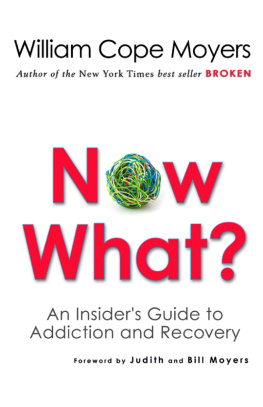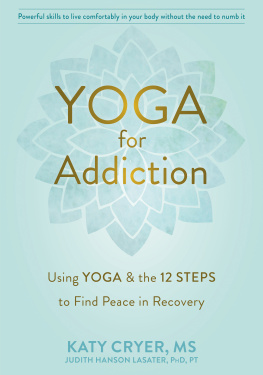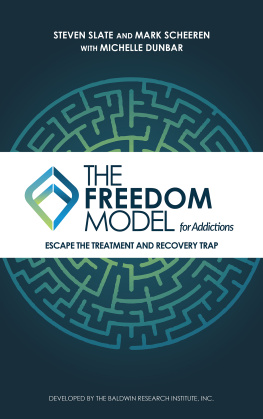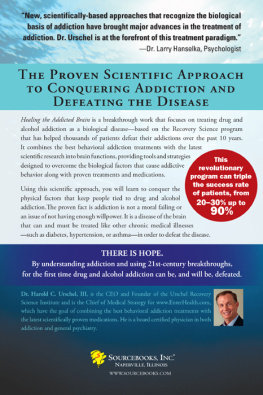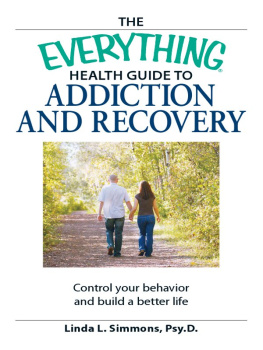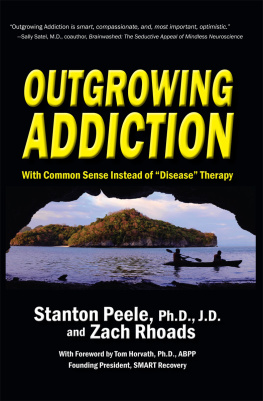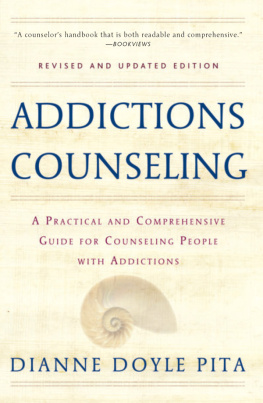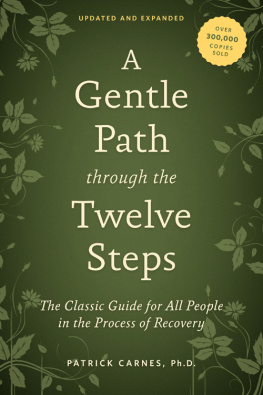Thank you for downloading this Touchstone eBook.
Join our mailing list and get updates on new releases, deals, bonus content and other great books from Touchstone and Simon & Schuster.
C LICK H ERE T O S IGN U P
or visit us online to sign up at
eBookNews.SimonandSchuster.com
We hope you enjoyed reading this Touchstone eBook.
Join our mailing list and get updates on new releases, deals, bonus content and other great books from Touchstone and Simon & Schuster.
C LICK H ERE T O S IGN U P
or visit us online to sign up at
eBookNews.SimonandSchuster.com
Other Books by Stanton Peele
Love and Addiction
How Much Is Too Much
The Science of Experience
The Meaning of Addiction
Visions of Addiction (edited volume)
Diseasing of America
Other Books Co-authored by Archie Brodsky
Love and Addiction
Burnout: Stages of Disillusionment in the Helping Professions
Medical Choices, Medical Chances
Sexual Dilemmas for the Helping Professional
Home Birth: A Practitioners Guide to Birth Outside the Hospital
Diabetes: Caring for Your Emotions As Well As Your Health
If This Is Love, Why Do I Feel So Insecure?
TOUCHSTONE
Rockefeller Center
1230 Avenue of the Americas
New York, New York 10020
www.SimonandSchuster.com
Copyright 1991 by Stanton Peele and Archie Brodsky with Mary Arnold
All rights reserved including the right of reproduction in whole or in part in any form.
Touchstone and colophon are registered trademarks of Simon & Schuster Inc.
Designed by Laurie Jewell
Library of Congress Cataloging in Publication data Peele, Stanton.
The truth about addiction and recovery : the life process program for outgrowing destructive habits / Stanton Peele, Archie Brodsky, with Mary Arnold.
p. cm.
Includes index.
1. Compulsive behavior. 2. Habit breaking. 3. Rehabilitation. I. Brodsky, Archie. II. Arnold, Mary, III. Title. RC533.P33 199190-27678
CIP
ISBN-13: 978-0-671-66901-0
ISBN-10: 0-671-66901-X
ISBN-13: 978-0-671-75530-0 (Pbk)
ISBN-10: 0-671-75530-7 (Pbk)
ISBN: 978-1-476-79396-2 (eBook)
To Marie Arnold and Sara Fromberg, for the heritage of grit, self-respect, and positive values they passed on to Dana Spencer, Haley Marie, and Anna Sara Peele.
To Robert Asahina, our editor, for his prescience and independence of purpose.

CONTENTS


A NOTE TO READERS

Readers of this book who wish to share their stories of addiction and recovery can write to Dr. Peele at the following address:
Dr. Stanton Peele, author of
The Truth About Addiction and Recovery
stanton@peele.net

INTRODUCTION

T HE GROWTH of addiction treatment in the United States, predicated on the idea that alcoholism and addictions of all kinds are diseases, is a public-relations triumph, and not a triumph of reason or science. The idea that modern addiction treatmentlike that provided at private alcoholism hospitalsis eminently successful is a myth. More people quit alcoholism and addiction on their own than do so through treatment, and evidence is that in many cases people trying to quit an addiction (such as smoking) are better off attempting it without the help of typical treatment programs. There are therapies that work better than disease-oriented alcoholism clinics or nicotine-gum therapies for smokers, but you would be hard-pressed to find such treatment if you tried.
We believe that many people want an open-minded, realistic way to understand and deal with addictionstheir own, their spouses, their childrens, their friends and employees. This book is a response to that need. It begins by making clear what addiction is and what it is not. Addiction is an ingrained habit that undermines your health, your work, your relationships, your self-respect, but that you feel you cannot change. Addictions are difficult to change, because you have relied on themin many cases for years or decadesas ways of getting through life, of gaining satisfaction, of spending time, and even of defining who you are. Whereas some addictions involve drugs (like smoking or problem drinking), some do not (like shopping, or eating, or sex). It is impossible, therefore, to relate addiction to one chemical or biological process or another.
Because of the distinctive approach we take, you will find guidance here that in most cases you cannot get elsewhere. That is, we do not regard addiction of any kind as a disease. Thus, we do not recommend that you see a doctor or join a twelve-step group organized for one disease or another as a way of dealing with addiction. These approaches, we believe, have already been shown to be less effective than others that are available. The same is true if you are concerned that your children and their friends are using alcohol and drugsthe common practice of putting them in a hospital will usually do more harm than good.
Our approach, called the Life Process Program for changing destructive habits, is instead rooted in common sense and peoples actual experience. This approach is more empoweringand therefore more effectivethan conventional treatment or self-help methods. Because our approach differs so drastically from the messages you get constantly in public-service announcements and advertisements for alcoholism centers, we review a great deal of evidence to show you that the conventional notion of addiction as an uncontrollable disease is baseless. It doesnt get at what causes people to be addicted and it is ineffective for most people as a method of treatment or self-help.
It is disturbing that an approach to addiction that is widely claimed to be scientific is actually false and is more often harmful than beneficial. The good news is that many people are beginning to question how accurate or helpful it is to think of addiction as a disease. These may be people with substance-abuse problems whose needs are not met by twelve-step support groups. Or they may be people who dont buy the claim of the alcoholism movement that announcing you are powerless helps you change. They may be researchers who find that the evidence doesnt back up the personal testimony of addicts who tell us incessantly in the media that conventional treatment works. They may be individuals who have been exposed to the treatment systembecause their children used drugs or because they were arrested for drunk drivingand who were appalled by its coerciveness and irrationality. They may be especially mystified that anyone wants to weigh adolescents down with the message: Because you have been drinking or using drugs, or because your father or mother did, you have a disease you can never overcome.
Sometimes people with questions like these stumble upon the best-kept secret in the addiction treatment industrythat many more people give up addictions on their own than through treatment, without taking on the stigma that they suffer from a disease. TV talk-show host Oprah Winfrey, for example, discussed her struggle to lose (and keep off) weight on a show she did on the disease theory of alcoholism. She remarked that she could accept the disease theory intellectually, but that she just didnt see how believing she was forever powerless could possibly help her with her weight problem. What Oprah and others like her should know is that calling addiction a disease is just as wrong intellectually as it is unhelpful.
Next page

